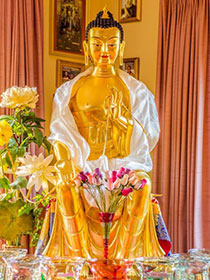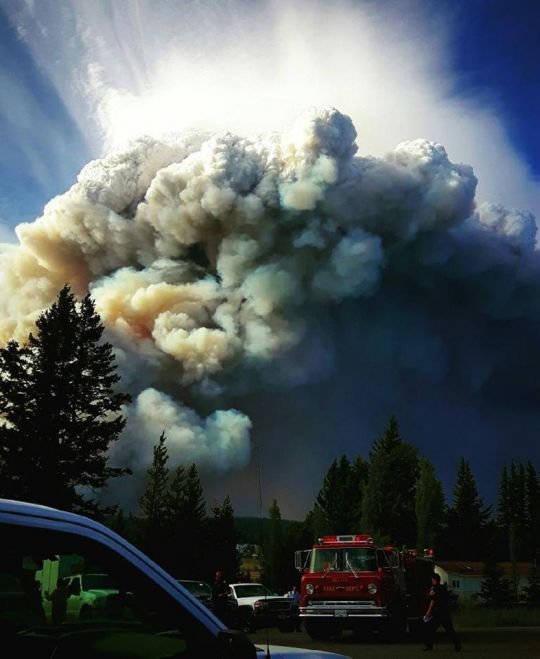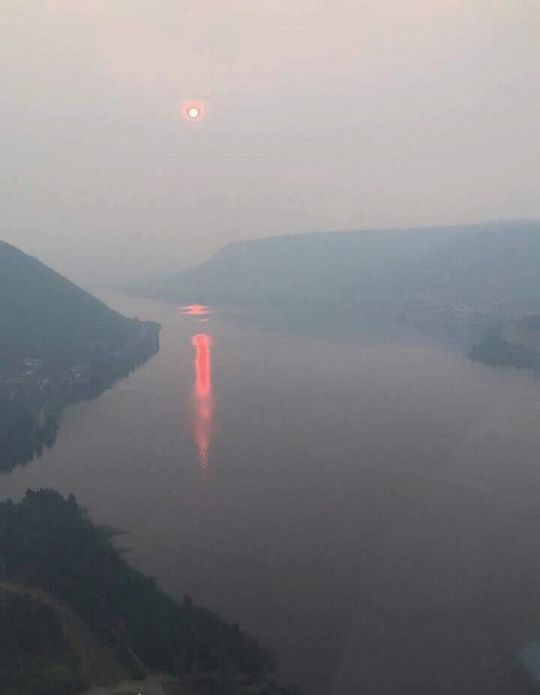- Home
- FPMT Homepage
Foundation for the Preservation of the Mahayana Tradition
The FPMT is an organization devoted to preserving and spreading Mahayana Buddhism worldwide by creating opportunities to listen, reflect, meditate, practice and actualize the unmistaken teachings of the Buddha and based on that experience spreading the Dharma to sentient beings. We provide integrated education through which people’s minds and hearts can be transformed into their highest potential for the benefit of others, inspired by an attitude of universal responsibility and service. We are committed to creating harmonious environments and helping all beings develop their full potential of infinite wisdom and compassion. Our organization is based on the Buddhist tradition of Lama Tsongkhapa of Tibet as taught to us by our founders Lama Thubten Yeshe and Lama Thubten Zopa Rinpoche.
- Willkommen
Die Stiftung zur Erhaltung der Mahayana Tradition (FPMT) ist eine Organisation, die sich weltweit für die Erhaltung und Verbreitung des Mahayana-Buddhismus einsetzt, indem sie Möglichkeiten schafft, den makellosen Lehren des Buddha zuzuhören, über sie zur reflektieren und zu meditieren und auf der Grundlage dieser Erfahrung das Dharma unter den Lebewesen zu verbreiten.
Wir bieten integrierte Schulungswege an, durch denen der Geist und das Herz der Menschen in ihr höchstes Potential verwandelt werden zum Wohl der anderen – inspiriert durch eine Haltung der universellen Verantwortung und dem Wunsch zu dienen. Wir haben uns verpflichtet, harmonische Umgebungen zu schaffen und allen Wesen zu helfen, ihr volles Potenzial unendlicher Weisheit und grenzenlosen Mitgefühls zu verwirklichen.
Unsere Organisation basiert auf der buddhistischen Tradition von Lama Tsongkhapa von Tibet, so wie sie uns von unseren Gründern Lama Thubten Yeshe und Lama Thubten Zopa Rinpoche gelehrt wird.
- Bienvenidos
La Fundación para la preservación de la tradición Mahayana (FPMT) es una organización que se dedica a preservar y difundir el budismo Mahayana en todo el mundo, creando oportunidades para escuchar, reflexionar, meditar, practicar y actualizar las enseñanzas inconfundibles de Buda y en base a esa experiencia difundir el Dharma a los seres.
Proporcionamos una educación integrada a través de la cual las mentes y los corazones de las personas se pueden transformar en su mayor potencial para el beneficio de los demás, inspirados por una actitud de responsabilidad y servicio universales. Estamos comprometidos a crear ambientes armoniosos y ayudar a todos los seres a desarrollar todo su potencial de infinita sabiduría y compasión.
Nuestra organización se basa en la tradición budista de Lama Tsongkhapa del Tíbet como nos lo enseñaron nuestros fundadores Lama Thubten Yeshe y Lama Zopa Rinpoche.
A continuación puede ver una lista de los centros y sus páginas web en su lengua preferida.
- Bienvenue
L’organisation de la FPMT a pour vocation la préservation et la diffusion du bouddhisme du mahayana dans le monde entier. Elle offre l’opportunité d’écouter, de réfléchir, de méditer, de pratiquer et de réaliser les enseignements excellents du Bouddha, pour ensuite transmettre le Dharma à tous les êtres. Nous proposons une formation intégrée grâce à laquelle le cœur et l’esprit de chacun peuvent accomplir leur potentiel le plus élevé pour le bien d’autrui, inspirés par le sens du service et une responsabilité universelle. Nous nous engageons à créer un environnement harmonieux et à aider tous les êtres à épanouir leur potentiel illimité de compassion et de sagesse. Notre organisation s’appuie sur la tradition guéloukpa de Lama Tsongkhapa du Tibet, telle qu’elle a été enseignée par nos fondateurs Lama Thoubtèn Yéshé et Lama Zopa Rinpoché.
Visitez le site de notre Editions Mahayana pour les traductions, conseils et nouvelles du Bureau international en français.
Voici une liste de centres et de leurs sites dans votre langue préférée
- Benvenuto
L’FPMT è un organizzazione il cui scopo è preservare e diffondere il Buddhismo Mahayana nel mondo, creando occasioni di ascolto, riflessione, meditazione e pratica dei perfetti insegnamenti del Buddha, al fine di attualizzare e diffondere il Dharma fra tutti gli esseri senzienti.
Offriamo un’educazione integrata, che può trasformare la mente e i cuori delle persone nel loro massimo potenziale, per il beneficio di tutti gli esseri, ispirati da un’attitudine di responsabilità universale e di servizio.
Il nostro obiettivo è quello di creare contesti armoniosi e aiutare tutti gli esseri a sviluppare in modo completo le proprie potenzialità di infinita saggezza e compassione.
La nostra organizzazione si basa sulla tradizione buddhista di Lama Tsongkhapa del Tibet, così come ci è stata insegnata dai nostri fondatori Lama Thubten Yeshe e Lama Zopa Rinpoche.
Di seguito potete trovare un elenco dei centri e dei loro siti nella lingua da voi prescelta.
- 欢迎 / 歡迎
简体中文
“护持大乘法脉基金会”( 英文简称:FPMT。全名:Foundation for the Preservation of the Mahayana Tradition) 是一个致力于护持和弘扬大乘佛法的国际佛教组织。我们提供听闻,思维,禅修,修行和实证佛陀无误教法的机会,以便让一切众生都能够享受佛法的指引和滋润。
我们全力创造和谐融洽的环境, 为人们提供解行并重的完整佛法教育,以便启发内在的环宇悲心及责任心,并开发内心所蕴藏的巨大潜能 — 无限的智慧与悲心 — 以便利益和服务一切有情。
FPMT的创办人是图腾耶喜喇嘛和喇嘛梭巴仁波切。我们所修习的是由两位上师所教导的,西藏喀巴大师的佛法传承。
繁體中文
護持大乘法脈基金會”( 英文簡稱:FPMT。全名:Found
ation for the Preservation of the Mahayana Tradition ) 是一個致力於護持和弘揚大乘佛法的國際佛教組織。我們提供聽聞, 思維,禪修,修行和實證佛陀無誤教法的機會,以便讓一切眾生都能 夠享受佛法的指引和滋潤。 我們全力創造和諧融洽的環境,
為人們提供解行並重的完整佛法教育,以便啟發內在的環宇悲心及責 任心,並開發內心所蘊藏的巨大潛能 — 無限的智慧與悲心 – – 以便利益和服務一切有情。 FPMT的創辦人是圖騰耶喜喇嘛和喇嘛梭巴仁波切。
我們所修習的是由兩位上師所教導的,西藏喀巴大師的佛法傳承。 察看道场信息:
- FPMT Homepage
- News/Media
-
- Study & Practice
-
-
- About FPMT Education Services
- Latest News
- Programs
- New to Buddhism?
- Buddhist Mind Science: Activating Your Potential
- Heart Advice for Death and Dying
- Discovering Buddhism
- Living in the Path
- Exploring Buddhism
- FPMT Basic Program
- FPMT Masters Program
- FPMT In-Depth Meditation Training
- Maitripa College
- Lotsawa Rinchen Zangpo Translator Program
- Universal Education for Compassion & Wisdom
- Online Learning Center
-
- Prayers & Practice Materials
- Overview of Prayers & Practices
- Full Catalogue of Prayers & Practice Materials
- Explore Popular Topics
- Benefiting Animals
- Chenrezig Resources
- Death & Dying Resources
- Lama Chopa (Guru Puja)
- Lama Zopa Rinpoche: Compendium of Precious Instructions
- Lama Zopa Rinpoche: Life Practice Advice
- Lama Zopa Rinpoche Practice Series
- Lamrim Resources
- Mantras
- Prayer Book Updates
- Purification Practices
- Sutras
- Thought Transformation (Lojong)
- Audio Materials
- Dharma Dates - Tibetan Calendar
- Translation Services
- Publishing Services
- Ways to Offer Support
- Prayers & Practice Materials
-
- Teachings and Advice
- Find Teachings and Advice
- Lama Zopa Rinpoche Advice Page
- Lama Zopa Rinpoche: Compendium of Precious Instructions
- Lama Zopa Rinpoche Video Teachings
- ༧སྐྱབས་རྗེ་བཟོད་པ་རིན་པོ་ཆེ་མཆོག་ནས་སྩལ་བའི་བཀའ་སློབ་བརྙན་འཕྲིན།
- Podcasts
- Lama Yeshe Wisdom Archive
- Buddhism FAQ
- Dharma for Young People
- Resources on Holy Objects
- Teachings and Advice
-
-
*If a menu item has a submenu clicking once will expand the menu clicking twice will open the page.
-
-
- Centers
-
- Teachers
-
- Projects
-
-
-
-
*If a menu item has a submenu clicking once will expand the menu clicking twice will open the page.
-
-
- FPMT
-
- Shop
-
-
-
The Foundation Store is FPMT’s online shop and features a vast selection of Buddhist study and practice materials written or recommended by our lineage gurus. These items include homestudy programs, prayers and practices in PDF or eBook format, materials for children, and other resources to support practitioners.
Items displayed in the shop are made available for Dharma practice and educational purposes, and never for the purpose of profiting from their sale. Please read FPMT Foundation Store Policy Regarding Dharma Items for more information.
-
-
31
In early July, massive wildfires in central British Columbia, Canada, broke out forcing tens of thousands of people to be evacuated from their homes, including some students from Gendun Drubpa Centre in Williams Lake. They were relieved to hear on July 27 that they could return home. Spiritual program coordinator Dianne Noort reported that for now “Gendun Drubpa Buddhist Centre is fine and we will be assessing the smoke damage.” The condition of the center’s Stupa for World Peace and Environmental Harmony, which is on private property at nearby Spokin Lake, is unknown. Dianne shared some of her experiences as the south Cariboo wildfires got worse:
We carried on with our usual daily tasks and practices, but with an awareness of the wildfires. At first, everything seemed to be under control until an overnight wind and lightning storm blew out our power and then our phone, pushing us to a more alert state. Our telephone was restored first, and we received calls from close friends and family, telling us of the alarming increase in fire activity. …
We live in the Cariboo, an area on a vast plateau in southcentral British Columbia with lots of wilderness. Our daily mindset is one of rural living among trees and thick-tangled underbrush, wild animals, ranging cattle, resource extraction, and dirt roads. The commercial centers, Quesnel, Willimas Lake, and 100 Mile House, were all under threat of wildfire. So, abruptly our daily activities were less pressing, and it was more important to prepare for possibly having to leave the area. As we packed our two vehicles, three categories of possessions became evident: 1) what was needed on the road if we had to spend a night or two somewhere without food or facilities; 2) ourselves and our two large dogs, some clothing, and leashes; 3) important papers, laptops, and a few of our most valued objects. I watched my mind categorize what was important. I’m generally a minimalist; yet even so, I’d never had to think this way.
On the fourth day, our power was restored and we learned that our village gas station had reopened—a $30.00 limit per vehicle and a $20.00 limit to fill gas cans. Our usually stalwart neighbor appeared really worried about how much gas we all had and mentioned several times how long his generator had to run to get the freezer level up. He and another neighbor had also set up their fire pumps in the lake and were hosing down their roofs and the perimeters of their houses. That night we watched the TV news and the seriousness of the situation sunk in. The Williams Lake Airport was even closed. That we had phone and electricity seemed nothing short of a miracle!
Although our village of Horsefly was still safe, two days later we decided to try and get out. The smoke was very thick. Exact information on which roads were open was difficult to ascertain, partly because things were changing so quickly and partly due to no cell service in the area, making it challenging for even emergency service providers to communicate with each other. We set off in our two vehicles with our two dogs and worked our way through the back roads, taking a wrong turn, back-tracking to correct it, and eventually arriving at a Cariboo Highway checkpoint, where we were told that there was no going south as the highway had been closed only ten minutes before. 100 Mile House was evacuated. The earnest young Royal Canadian Mounted Police officer informed us that he had just lost his house near the Williams Lake Airport.
It was uncanny, with burning fires on the both sides of the road, burned telephone poles being replaced by a dozen crews from the power company, smokey haze, emergency crews everywhere. Only two gas stations in Williams Lake had power, and we lined up for gas. The young couple behind us were part of the hundreds that had just been evacuated from the community adjacent to the airport. After filling up, we went to check on Gendun Drubpa Buddhist Centre, let the dogs out of the vehicle to feed them, and sent some text and email messages out to friends and family. Perhaps bizarrely, I watered the plants. After, we high-tailed it home, arriving just before dark.
I called as many of our Gendun Drubpa members and associates as possible in Williams Lake and surrounding areas to see how they were doing and pass on important wildfire practice information from Lama Zopa Rinpoche’s “New Advice on Wildfires.” Barrie and Marilyn, owners of the beautiful property where our Stupa for World Peace and Environmental Harmony is located, were still at their home and reported that helicopters were using the lake to fill their buckets with water. Bulldozers at the southeast corner of lake had pushed through and built a fire-guard.
At one point, I received an email from center director Colleen O’Neill:
“Once the evacuation alert was issued, I packed the thangkas and bigger statues and altar items [from the center] into my car along with a small amount of my personal belongings. The next day, I decided to evacuate due to very poor air quality. I left all our valuable and holy objects in the care of one of our members further away from the city. I was not able to remove our extensive library, our Maitreya statue, or our other ritual items or supplies because I drive a small sedan. I had to leave a bit of room for my personal precious items, and at that point in time, was not sure if I would have take my grandchildren as well because they were in my care.”
A state of emergency was called by our government. Life was surreal. It was like we were under house-arrest; our main preoccupation was to keep abreast of the ever-changing situation. The road going north to Quesnel and Prince George reopened, but on a permit-only basis. Before the week drew to a close, Williams Lake was also evacuated and everyone was directed south to Kamloops. The whole city shut down as the fires were only 7 kilometers [4 miles] away from the center of town. Now, supplies were really getting scarce. The smoke rolled in even thicker. I continued my Medicine Buddha practice and posted updated wildfire news on the Gendun Drubpa Centre Facebook page. I teach a yoga class in my community and to lighten the mood I offered a free “stress-busting” session. It was well attended!
As of July 27, residents of Williams Lake were welcomed back, but are still under an alert order. They are advised to have their cars packed, with a full tank of gas and be ready to leave again in thirty minutes. We have no updated news of the stupa and ask for everyone’s prayers and support.
Read Lama Zopa Rinpoche’s advice for dispelling natural disasters, including fires:
https://fpmt.org/teachers/zopa/advice/#disasters
Updates on the 2017 British Columbia wildfires is available online:
http://www2.gov.bc.ca/gov/content/safety/wildfire-status/wildfire-situation
Mandala brings you news of Lama Zopa Rinpoche and of activities, teachings and events from over 160 FPMT centers, projects and services around the globe. If you like what you read in Mandala, consider becoming a Friend of FPMT, which supports our work.
- Tagged: canada, fire, gendun drubpa centre
- Home
- News/Media
- Study & Practice
- About FPMT Education Services
- Latest News
- Programs
- New to Buddhism?
- Buddhist Mind Science: Activating Your Potential
- Heart Advice for Death and Dying
- Discovering Buddhism
- Living in the Path
- Exploring Buddhism
- FPMT Basic Program
- FPMT Masters Program
- FPMT In-Depth Meditation Training
- Maitripa College
- Lotsawa Rinchen Zangpo Translator Program
- Universal Education for Compassion & Wisdom
- Online Learning Center
- Prayers & Practice Materials
- Overview of Prayers & Practices
- Full Catalogue of Prayers & Practice Materials
- Explore Popular Topics
- Benefiting Animals
- Chenrezig Resources
- Death & Dying Resources
- Lama Chopa (Guru Puja)
- Lama Zopa Rinpoche: Compendium of Precious Instructions
- Lama Zopa Rinpoche: Life Practice Advice
- Lama Zopa Rinpoche Practice Series
- Lamrim Resources
- Mantras
- Prayer Book Updates
- Purification Practices
- Sutras
- Thought Transformation (Lojong)
- Audio Materials
- Dharma Dates – Tibetan Calendar
- Translation Services
- Publishing Services
- Teachings and Advice
- Find Teachings and Advice
- Lama Zopa Rinpoche Advice Page
- Lama Zopa Rinpoche: Compendium of Precious Instructions
- Lama Zopa Rinpoche Video Teachings
- ༧སྐྱབས་རྗེ་བཟོད་པ་རིན་པོ་ཆེ་མཆོག་ནས་སྩལ་བའི་བཀའ་སློབ་བརྙན་འཕྲིན།
- Podcasts
- Lama Yeshe Wisdom Archive
- Buddhism FAQ
- Dharma for Young People
- Resources on Holy Objects
- Ways to Offer Support
- Centers
- Teachers
- Projects
- Charitable Projects
- Make a Donation
- Applying for Grants
- News about Projects
- Other Projects within FPMT
- Support International Office
- Projects Photo Galleries
- Give Where Most Needed
- FPMT
- Shop
Subscribe to FPMT News
Translate*
*powered by Google TranslateTranslation of pages on fpmt.org is performed by Google Translate, a third party service which FPMT has no control over. The service provides automated computer translations that are only an approximation of the websites' original content. The translations should not be considered exact and only used as a rough guide.I hope that you understand what the word ‘spiritual’ really means. It means to search for – to investigate – the true nature of the mind. There’s nothing spiritual outside. My rosary isn’t spiritual; my robes aren’t spiritual. Spiritual means the mind and spiritual people are those who seek its nature.










